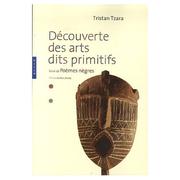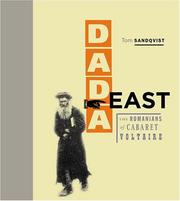| Listing 1 - 2 of 2 |
Sort by
|

ISBN: 2754101195 9782754101196 Year: 2006 Publisher: Paris : Hazan,
Abstract | Keywords | Export | Availability | Bookmark
 Loading...
Loading...Choose an application
- Reference Manager
- EndNote
- RefWorks (Direct export to RefWorks)
Dès 1917 à Zurich, à l'époque du Cabaret Voltaire, jeune auteur de La Première Aventure céleste de Mr Antipyrine et bientôt du célèbre " Manifeste Dada 1918 ", Tristan Tzara s'est passionné pour les arts africains et océaniens. Il a publié dans la revue Dada une " Chanson du Cacadou " de la tribu Aranda et a réuni et adapté, à la faveur de sérieuses recherches, un ensemble de " Poèmes nègres ". Les vertus sonores de ces poèmes faisaient un pont avec la poésie abstraite de sons qui avait cours au Cabaret Voltaire et avec la remise en cause des valeurs prétendument supérieures d'une civilisation occidentale en plein carnage. Tzara fut ultérieurement reconnu comme l'un des rares connaisseurs des arts dits primitifs et constitua une précieuse collection tout en donnant sporadiquement de brefs essais sur le sujet. L'ensemble de ces interventions tout au long de sa vie se trouve ici réuni avec les poèmes nègres qu'il avait recueillis et adaptés pour le lecteur français. Ces poèmes constituent une incursion exceptionnelle dans la " structure primitive de la vie affective ". Dada avait tenté de relier " l'art nègre, africain et océanien à la vie mentale et à son expression immédiate au niveau de l'homme contemporain, en organisant des soirées nègres de danse et de musique improvisées. " " II s'agissait, écrit Tzara, de retrouver, dans les profondeurs de la conscience, les sources exaltantes de la fonction poétique. " (extrait du quatrième de couverture)
Dadaism --- Arts, Primitive --- French poetry --- African poetry --- Dadaïsme --- Arts primitifs --- Poésie française --- Poésie africaine --- Poésie --- Tzara, Tristan --- Dadaïsme --- Poésie française --- Poésie africaine --- Arts premiers --- Arts.

Abstract | Keywords | Export | Availability | Bookmark
 Loading...
Loading...Choose an application
- Reference Manager
- EndNote
- RefWorks (Direct export to RefWorks)
"In Dada East Tom Sandqvist shows that Dada did not spring full-grown from a Zurich literary salon but grew out of an already vibrant artistic tradition in Eastern Europe - particularly Romania - that was transposed to Switzerland when a group of Romanian modernists settled in Zurich. Bucharest and other cities in Romania had been the scene of Dada-like poetry, prose, and spectacle in the years before World War I. One of the leading lights was Tristan Tzara, who begn his career in avant-garde literature at fifteen when he cofounded the magazine Simbolul. Tzara - who himself coined the term "Dada, " inspired by an obscure connection of his birthday to an Orthodox saint - was at the Cabaret Voltaire that night, along with fellow Romanians Marcel, Jules, and Georges Janco and Arthur Segal. It's not a coincidence, Sandqvist argues, that so many of the first dadaist group was Romanians. Sandqvist traces the artistic and personal transformations that took place in the "little Paris of the Balkans" before they took center stage elsewhere, finding sources as varied as symbolism, futurism, and folklore. He points to a connection between Romanian modernists and the Eastern European Yiddish tradition; Tzara, the Janco brothers, and Segal all grew up within Jewish culture and traditions." "For years, the communist authorities in Romania disowned and disavowed Romania's avant-garde movements. Now, as archives and libraries are opening to Western scholars, Tom Sandqvist tells the secret history of Dada's Romanian roots."--BOOK JACKET.
Tom Sandqvist --- kunst --- twintigste eeuw --- dada --- dadaïsme --- Roemenië --- Tzara Tristan --- Janco Marcel --- Segal Arthur --- Boekarest --- jodendom --- literatuur --- poëzie --- kunst en literatuur --- Chemarea --- Simbolul --- symbolisme --- Zwitserland --- Zürich --- Cabaret Voltaire --- 7.036 --- Arts, Romanian --- Avant-garde (Aesthetics) --- Dadaism --- Jewish artists --- History --- Arts roumains --- Avant-garde (Esthétique) --- Dadaïsme --- Artistes juifs --- Histoire --- Aesthetics --- Modernism (Art) --- Romanian arts --- Artists, Jewish --- Artists --- Dada --- Tabu-Dadaism --- Arts, Modern --- Arts [Romanian] --- 20th century --- Avant-Garde (Aesthetics) --- Romania --- Arts, Romanian. --- Avant-garde (Aesthetics). --- Avantgarde --- Dadaism. --- Dadaismus --- Jewish artists. --- Janco, Marcel --- Segal, Arthur (Künstler) --- Tzara, Tristan --- Segal, Arthur, --- 1900-1999. --- Romania. --- Rumänen --- Rumänien --- Arts, Romanian - 20th century. --- Avant-garde (Aesthetics) - Romania - History - 20th century. --- Dadaism - Romania. --- Jewish artists - Romania - History - 20th century.
| Listing 1 - 2 of 2 |
Sort by
|

 Search
Search Feedback
Feedback About
About Help
Help News
News